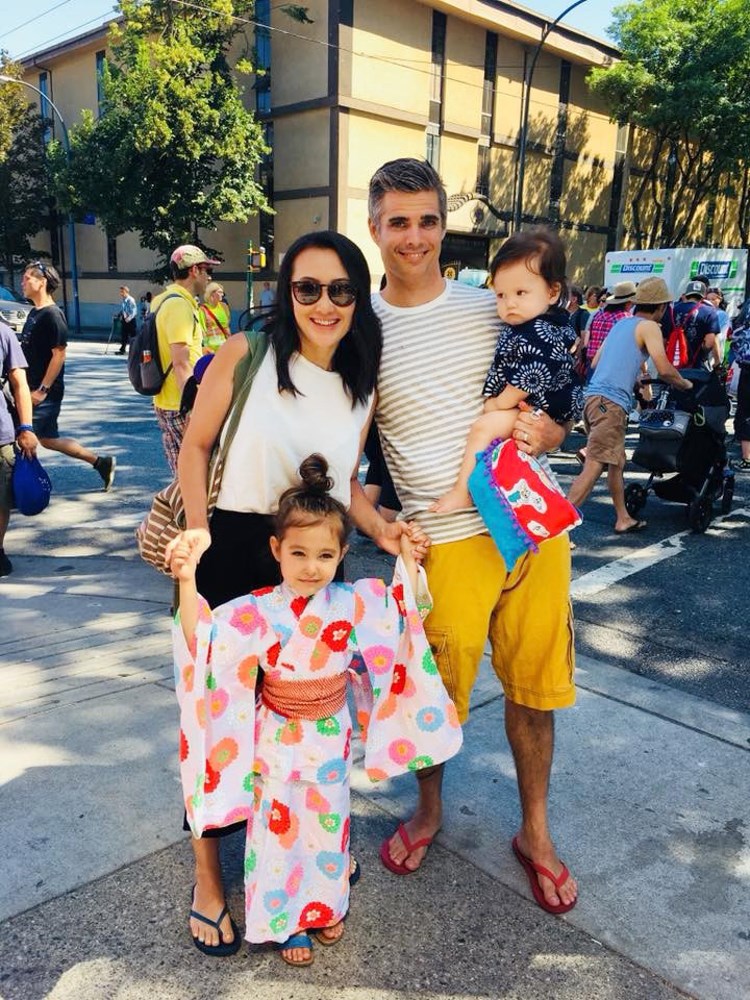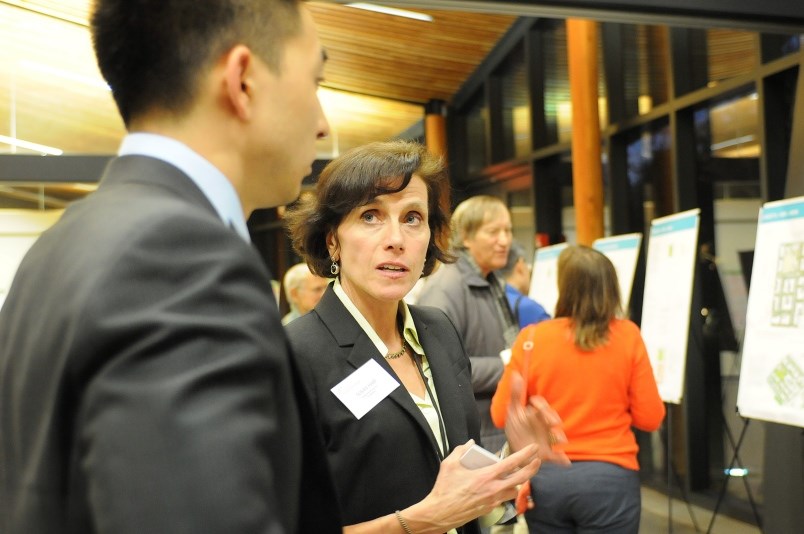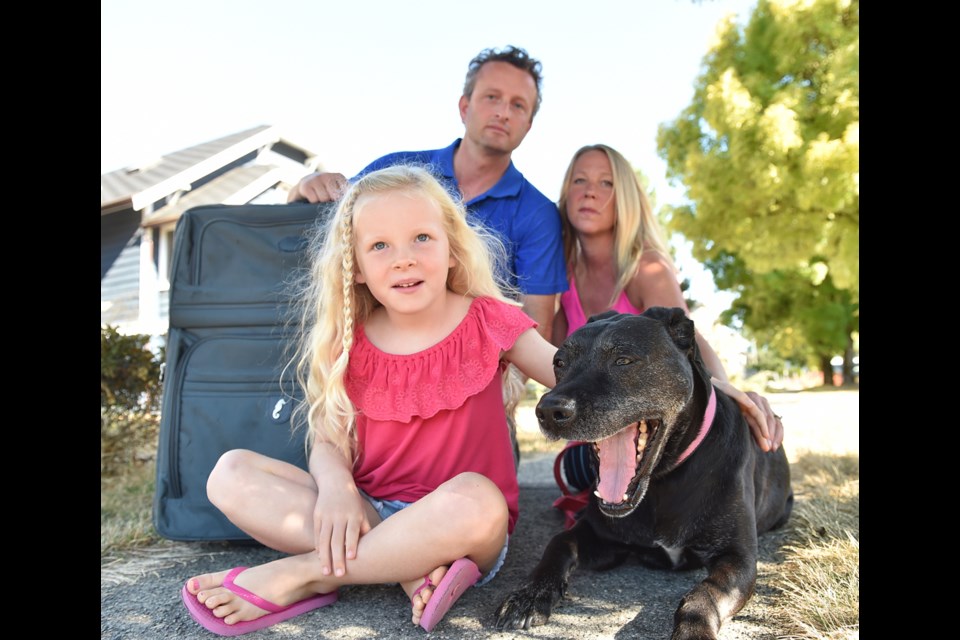It’s taken more than two decades for Bryan Stewart and Andrea Robbie to give up on Vancouver. But like countless individuals and middle-income families before them — some of whom have written — they’re ditching the city.
Instead of a letter or a blog post, Stewart announced the couple’s decision on social media.
“After 2nd renoviction in last 8 months, after 20 yrs of fighting for ย้ถนดซรฝำณปญneighbourhoods for families, it looks like like [sic] our family will be moving to White Rock! I wish all my ย้ถนดซรฝำณปญfriends the best of luck continuing to fight the good fight for families!,” he tweeted July 12.
Stewart and Robbie, who have a six-year-old daughter, Sadie, and a 12-year-old dog, Maggie, only plan to live in that municipality for a few years, before leaving the Lower Mainland altogether — all in hopes of settling down in a community that makes financial sense.
But they’d rather stay.
While talking to the Courier, Robbie choked up several times about her family’s inability to find secure, affordable, family-sized housing that’s pet friendly.
“Sharks are on the land, not in the sea anymore. I feel everything has been ripped from us — twice now,” she said.
Efforts by the city to address affordability and adopt more policies that aim to increase the amount of family housing geared towards ย้ถนดซรฝำณปญincomes have come too late for the couple. They maintain it will take years to see the fruits of any new initiatives.
Rather than sticking it out, they’ve signed a lease in White Rock where they’ll head at month’s end.
After 2nd renoviction in last 8 months, after 20 yrs of fighting for ย้ถนดซรฝำณปญneighbourhoods for families, it looks like like our family will be moving to White Rock! I wish all my ย้ถนดซรฝำณปญfriends the best of luck continuing to fight the good fight for families!
— Bryan Stewart (@goodwithwood75)
“I’m broken-hearted. This is my home,” Robbie says.
Whether ย้ถนดซรฝำณปญis doing enough to keep families from leaving remains debatable, but Susan Haid, the city’s director of long range and strategic planning, said the city has bolstered its efforts to improve housing diversity and create the “right supply.”
“We would really like families to stay. We know that there are challenges right now and I think we’re really taking those head on,” she said. “… We need engagement right now. There is a lot of action happening and we encourage families to be part of that conversation.”
MOVING ON
Robbie, a long-time Vancouverite, moved here from ย้ถนดซรฝำณปญIsland 25 years ago. Ten years ago, she met Stewart, who’s originally from Squamish. He’s lived in the city for two decades.
Robbie runs a small business out of her home, works part time in a restaurant and also has an adult son who no longer lives with them.
Stewart, who used to run his own business doing small renovations, now works for an engineering company but he still spends weekends and vacation time on contracting projects to earn extra cash — most recently to cover moving expenses.
The couple had hoped to buy a home at one point, but they weren’t financially established enough when it might have been possible. Now it’s out of the question. Even though they collectively earn about $100,000 a year, they wouldn’t be able to come up with a sufficient down payment or easily cover a hefty mortgage.
Renting has its own challenges — affordable places are hard to come by, especially for people with pets. Even if you snag a well-priced apartment or house, there’s no guarantee of being able to stay long-term. That’s a major problem for families with children who prefer not to move schools or fear losing a hard-to-find childcare space.
In just over 2 weeks, we say good by to Vancouver, our home of 20 years and move to White Rock. For how long remains to be seen....we’ll never own a place of our own in the Lower Mainland now, economics will mean new pastures soon enough...
— Bryan Stewart (@goodwithwood75)
Robbie and Stewart lived in their rental home in East ย้ถนดซรฝำณปญfor eight years until last October when they were handed an eviction notice and told to leave by Dec. 31. The landlord said family was moving in. The couple challenged the eviction but weren’t successful.
Thus began their search for a new place. Their wish-list included three bedrooms so they’d have enough space for a home office to share.
One possibility fell through at the last minute, leaving them desperate. Then a client offered to rent them their West Side home, which was vacant because it was going to be redeveloped. It worked for much of this year, but the city wants asbestos removed as part of the development process, which means they have to move out much sooner than expected.
A new search proved difficult. They scoured listings in ย้ถนดซรฝำณปญas well as nearby municipalities, but prices were steep for a three-bedroom. They eventually found a rancher 35 kilometres away in White Rock. It's a two-bedroom with a small den for $2,800 a month. They still have to pay the water bill, which pushes housing costs to about $3,000 and takes a substantial chunk out of their monthly budget. At that rate, and with all their other expenses, they can’t imagine staying in the Lower Mainland while still saving money for their future or being able to buy a home. They suspect they’ll eventually move to a community near Rossland, B.C.
“We can’t really make any more money and we’re already paying 50 to 60 per cent of our income towards housing. When it gets to 65, 70 [per cent], we’ll move to the Kootenays,” Stewart said.
“I have a good job here. But at some point you say, good job or not, what’s leftover is not enough. [I] might as well make $30 an hour and take a pay cut, do whatever I have to, and go live in Castlegar or Nelson — wherever we can find a place.”
Much more needs to be done to make the city affordable for families, Stewart said, while questioning existing policies that enable pricey rentals.
The city, for instance, gives development cost waivers to qualifying secured market rental projects if rents meet or fall below certain targets. In the “east area,” it’s $1,496 for a studio, $1,730 for a one-bedroom, $2,505 for a two-bedroom and $3,365 for a three-bedroom. In the “west area,” maximum rents under the are $1,646 for a studio, $1,903 for a one-bedroom, $2,756 for a two-bedroom and $3,702 for a three-bedroom.
“The city approves these developments with what’s considered affordable rentals,” he said. “They just approved one in Kerrisdale and the three-bedrooms are going to start at $3,700. You’d have to be making well over $100,000 to do it.”
CALGARY BOUND
Not long after Stewart posted about leaving Vancouver, Brette Mullins followed suit. But he’s heading much farther afield — all the way to Calgary.
With very sad news, my family and I are relocating to Calgary due to Vancouver, and the surrounding areas, becoming too unaffordable.
— Brette A. Mullins (@BretteMullins)
With my farewell to a city I love, here is a rendition of "Good Night Vancouver"
“With very sad news, my family and I are relocating to Calgary due to Vancouver, and the surrounding areas, becoming too unaffordable. With my farewell to a city I love, here is a rendition of ‘Good Night Vancouver,’” he tweeted July 25.
His “Good-Bye Vancouver” message lays the blame on Vision ย้ถนดซรฝำณปญMayor Gregor Robertson and former Liberal Premier Christy Clark. He bids goodbye to Robertson who he said “destroyed our dream,” and Clark who he hoped would one day “find your heart.” He also called out “shady developers” and included a listing for a tiny, aging home sold for almost $2.4 million.
Mullins, until recently, was a project manager for Provincial Health Services. His new position is with Alberta Health.
His young family includes wife Noriko, who’s on maternity leave, and two children, Mila, four, and Lio, eight months.

Their rationale for moving to Calgary is quantified in a spreadsheet with a comparative analysis of the two cities. Aside from wages, the spreadsheet lists everything from housing and childcare costs to car insurance and gas expenses. Mullins even took traffic, provincial education funding and crime clearance rates into consideration.
His conclusion: he’ll earn slightly less in his new job, but based on his calculations, he’ll still be ahead by tens of thousands of dollars year-over-year.
“When I looked at the final numbers, I thought I could pay for my daughter’s and my son’s weddings, and their schools,” he told the Courier. “That just made sense.”
Although they’ve been paying reasonable rent for their rental home of four years — $1,500 for an 800-square-foot, two-bedroom, one-bathroom place in East Vancouver, it’s tight for a growing family of four.
Mullins, who’s been renting in ย้ถนดซรฝำณปญfor 11 years, said the couple considered buying a home about two years into living in the city. They were “dumbfounded” to be approved for a $750,000 mortgage.
Houses were priced at about $600,000 at the time, but they thought it was too much.
“I think we were just scared,” he said.
Over the past two years, they tried to buy again in municipalities including Burnaby, Port Moody and Port Coquitlam but were outbid by $50,000 to $80,000 each time.
With a desire to put down secure roots, they decided that if Mullins could find a good position outside of Vancouver, they’d leave.
He landed the job with Alberta Health and the family departs ย้ถนดซรฝำณปญAug. 17. They hope to buy a home as soon as possible in Calgary.
The move is not without regret.
“There’s too many emotions. I’m scared because [I’m] starting a new career, [I’m] moving [my] family. Is it the right decision? I mean, I want to stay in Vancouver,” he said.
“I love my job, I love working for provincial health, I love my city, but I can’t stand the people who run it. I can’t stand a lot of the people who are running the show. And I’m angry because I have to leave. My wife’s angry… she loves this place.”
ALL ABOUT THE FAMILY
Seven thousand more families arrived in ย้ถนดซรฝำณปญbetween 2011 and 2016 based on Census figures, Susan Haid told the Courier. The number climbed from 82,600 to about 89,600.
“However, the proportion of total households of families with children has gone down a bit from 34 per cent to 31 per cent,” she added.
The City of Vancouver’s is its major initiative on family housing, which is defined as two and three bedrooms and up. The guidelines, which are meant to ensure homes are appropriate for families, address details such as common areas, amenities and offer guidance around layout.
They were , but an update has been underway for 14 months. More than 10,000 residents have been reached for feedback. The update is needed because the housing market has changed significantly and more people are living in apartments.
A recent online survey conducted as part of the update revealed families mainly want a third bedroom for use as a child’s bedroom, a guestroom or as an office space. Families also want outdoor areas and flexible space to accommodate their changing needs over time.
The guidelines are linked to a city policy that calls for 35 per cent family housing (two- and three-bedrooms), at a minimum, in multi-family redevelopments, with a target of 10 per cent at three bedrooms.
It’s the city’s , however, that’s one of the key initiatives meant to address the affordability crisis, land speculation and see that the “right supply” is built.
Adopted in late 2017, it envisions 72,000 new homes being built in the next 10 years, 40 per cent of which are aimed at families and adhere to the guidelines for family housing.
Part of the 72,000 target includes 10,000 new ground-oriented units that are particularly appealing to families, such as townhouses, coach houses and laneway homes.

Haid said “affordable housing” spans many types of housing and many incomes in the city’s definition and initiatives, but one of Housing Vancouver’s “very big moves” is around creating the “right supply,” which better matches city workers’ incomes.
One target area is the $30,000 to $80,000 moderate-income bracket.
Many , she said, such as the , are geared to that income level — below market but not necessarily social housing.
In terms of family housing, the city is also trying to create housing opportunities for household incomes of up to $150,000.
One possibility is “,” but it requires legislative changes to the ย้ถนดซรฝำณปญCharter for the city to enable it.
“But it is something that we have been looking at, and it is something potentially geared to that income level of $30,000 to $150,000 per household, recognizing that there can be two or multiple incomes,” Haid said.
She cited the Heather Lands policy statement, , as a “great example” of affordable housing initiatives, including affordable home ownership. The policy includes a range of housing, such as higher density strata and rental, at affordable rates, according to Haid, including ground-oriented homes and 20 per cent “attainable housing.”
The intent is the three First Nations involved in the development — Musqueam, Squamish and Tsleil-Waututh — will retain ownership of the lands and look at long-term leases, which would include the potential of attainable home ownership or attainable long-term leases of ground-oriented units.
“That’s something that has not been done in other community plans or policy statements and is really ground-breaking. It is very similar to the Whistler Housing Authority Model, so we’re exploring that,” Haid said.
In terms of social housing, the city calls for a minimum of 20 per cent social housing in all its community plans, with 50 per cent of those units being suitable for families with children.
The City of ย้ถนดซรฝำณปญis also in the process of launching its “Making Room” program, . Its goal is to increase the supply of medium-sized, medium-density housing throughout the city in single-family neighbourhoods, including laneway houses, townhouses, rowhouses and low-rise apartment buildings.
A public hearing takes place Sept. 18 for one of the quick-start actions that could see most . Over the next year, city staff will evaluate the possibility of allowing triplexes, four-plexes, townhouses and apartments. A report will go back to council in the spring of 2019.
“The city, compared to, I think, all municipalities in the region, and probably provincially, has been undertaking the greatest amount of both policy and regulatory efforts to increase affordable housing and the diversity of housing and the supply of housing,” Haid said.
“We’ve really been combatting this housing crisis on all fronts — from an affordability perspective, an income perspective, a supply perspective and a diversity perspective. We’ve certainly been increasing supply but we need more right supply, so we certainly encourage families to work with us and we want families to stay and engage.”
HEADING FOR A NEW HOME
Mullins isn’t waiting to see what the future holds for housing in Vancouver, although he had hoped to run for a council seat in the 2018 civic race under Proย้ถนดซรฝำณปญheaded by mayoral hopeful David Chen.
At this point, he maintains it’s near impossible for most middle-income families to stay if they want secure, affordable housing.
“There is no ability. You have a choice to rent for the rest of your life and you will not grow roots. You’ll not grow a rooted family where you can say, ‘We lived here and this is the house I grew up in.’ That’s just not going to happen. You will eventually have to keep moving around. That’s the price you pay,” he said.
When asked how he feels about the move, he said it's a mixture of fear and relief.
“I’ll miss Vancouver. Hands down. I’m excited to finally get a home, have my kids play in the backyard, get a dog,” he said.
“[But] no, I’m not excited about moving to another city. I wish I could do that here.”



